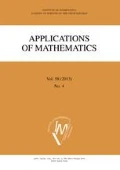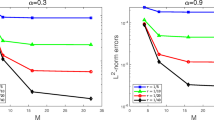Abstract
We consider highly accurate schemes for nonlinear time fractional Schrödinger equations (NTFSEs). While an L1 strategy is employed for approximating the Caputo fractional derivative in the temporal direction, compact CCD finite difference approaches are incorporated in the space. A highly effective hybrid L1-CCD method is implemented successfully. The accuracy of this linearized scheme is order six in space, and order 2 − γ in time, where 0 < γ < 1 is the order of the Caputo fractional derivative involved. It is proved rigorously that the hybrid numerical method accomplished is unconditionally stable in the Fourier sense. Numerical experiments are carried out with typical testing problems to validate the effectiveness of the new algorithms.
Similar content being viewed by others
References
D. Baleanu, K. Diethelm, E. Scalas, J. J. Trujillo: Fractional Calculus: Models and Numerical Methods. Series on Complexity, Nonlinearity and Chaos 5. World Scientific, Hackensack, 2012.
D. A. Benson, R. Schumer, M. M. Meerschaert, S. W. Wheatcraft: Fractional dispersion, Lévy motion, and the MADE tracer tests. Transp. Porous Media 42 (2001), 211–240.
A. H. Bhrawy, E. H. Doha, S. S. Ezz-Eldien, R. A. Van Gorder: A new Jacobi spectral collocation method for solving 1+1 fractional Schrödinger equations and fractional coupled Schrödinger systems. Eur. Phys. J. Plus 129 (2014), Article ID 260, 21 pages.
A. G. Bratsos: A linearized finite-difference scheme for the numerical solution of the nonlinear cubic Schrödinger equation. Korean J. Comput. Appl. Math. 8 (2001), 459–467.
Q. Chang, E. Jia, W. Sun: Difference schemes for solving the generalized nonlinear Schrödinger equation. J. Comput. Phys. 148 (1999), 397–415.
X. Chen, Y. Di, J. Duan, D. Li: Linearized compact ADI schemes for nonlinear time-fractional Schrödinger equations. Appl. Math. Lett. 84 (2018), 160–167.
B. Chen, D. He, K. Pan: A linearized high-order combined compact difference scheme for multi-dimensional coupled Burgers’ equations. Numer. Math., Theory Methods Appl. 11 (2018), 299–320.
B. Chen, D. He, K. Pan: A CCD-ADI method for two-dimensional linear and nonlinear hyperbolic telegraph equations with variable coefficients. Int. J. Comput. Math. 96 (2019), 992–1004.
P. C. Chu, C. Fan: A three-point combined compact difference scheme. J. Comput. Phys. 140 (1998), 370–399.
M. Cui: Compact finite difference method for the fractional diffusion equation. J. Comput. Phys. 228 (2009), 7792–7804.
M. Dehghan, A. Taleei: A compact split-step finite difference method for solving the nonlinear Schrödinger equations with constant and variable coefficients. Comput. Phys. Commun. 181 (2010), 43–51.
R. P. Feynman, A. R. Hibbs: Quantum Mechanics and Path Integrals. Dover Publications, New York, 2010.
G.-H. Gao, H.-W. Sun: Three-point combined compact alternating direction implicit difference schemes for two-dimensional time-fractional advection-diffusion equations. Commun. Comput. Phys. 17 (2015), 487–509.
G.-H. Gao, H.-W. Sun: Three-point combined compact difference schemes for time-fractional advection-diffusion equations with smooth solutions. J. Comput. Phys. 298 (2015), 520–538.
G.-H. Gao, H.-W. Sun, Z.-Z. Sun: Stability and convergence of finite difference schemes for a class of time-fractional sub-diffusion equations based on certain superconvergence. J. Comput. Phys. 280 (2015), 510–528.
G.-H. Gao, Z.-Z. Sun: A compact finite difference scheme for the fractional sub-diffusion equations. J. Comput. Phys. 230 (2011), 586–595.
G.-H. Gao, Z.-Z. Sun, H.-W. Zhang: A new fractional numerical differentiation formula to approximate the Caputo fractional derivative and its applications. J. Comput. Phys. 259 (2014), 33–50.
A. K. Golmankhaneh, D. Baleanu: Calculus on fractals. Fractional Dynamics. De Gruyter, Berlin, 2015, pp. 307–332.
D. He: An unconditionally stable spatial sixth-order CCD-ADI method for the two-dimensional linear telegraph equation. Numer. Algorithms 72 (2016), 1103–1117.
D. He, K. Pan: A fifth-order combined compact difference scheme for the Stokes flow on polar geometries. East Asian J. Appl. Math. 7 (2017), 714–727.
D. He, K. Pan: An unconditionally stable linearized CCD-ADI method for generalized nonlinear Schrödinger equations with variable coefficients in two and three dimensions. Comput. Math. Appl. 73 (2017), 2360–2374.
T. N. Jones, Q. Sheng: Asymptotic stability of a dual-scale compact method for approximating highly oscillatory Helmholtz solutions. J. Comput. Phys. 392 (2019), 403–418.
N. A. Khan, M. Jamil, A. Ara: Approximate solutions to time-fractional Schrödinger equation via homotopy analysis method. Int. Sch. Res. Not. 2012 (2012), Article ID 197068, 11 pages.
R. Klages, G. Radons, I. M. Sokolov (eds.): Anomalous Transport: Foundations and Applications. Wiley, Weinheim, 2008.
N. Laskin: Fractional quantum mechanics and Lévy path integrals. Phys. Lett., A 268 (2000), 298–305.
S. T. Lee, J. Liu, H.-W. Sun: Combined compact difference scheme for linear second-order partial differential equations with mixed derivative. J. Comput. Appl. Math. 264 (2014), 23–37.
L. Z. Li, H.-W. Sun, S.-C. Tam: A spatial sixth-order alternating direction implicit method for two-dimensional cubic nonlinear Schrödinger equations. Comput. Phys. Commun. 187 (2015), 38–48.
D. Li, J. Wang, J. Zhang: Unconditionally convergent L1-Galerkin FEMs for nonlinear time-fractional Schrödinger equations. SIAM. J. Sci. Comput. 39 (2017), A3067–A3088.
H.-L. Liao, H.-S. Shi, Y. Zhao: Numerical study of fourth-order linearized compact schemes for generalized NLS equations. Comput. Phys. Commun. 185 (2014), 2240–2249.
A. Mohebbi, M. Abbaszadeh, M. Dehghan: The use of a meshless technique based on collocation and radial basis functions for solving the time fractional nonlinear Schrödinger equation arising in quantum mechanics. Eng. Anal. Bound. Elem. 37 (2013), 475–485.
D. A. Murio: Implicit finite difference approximation for time fractional diffusion equations. Comput. Math. Appl. 56 (2008), 1138–1145.
M. Naber: Time fractional Schrödinger equation. J. Math. Phys. 45 (2004), 3339–3352.
S. Z. Rida, H. M. El-Sherbiny, A. A. M. Arafa: On the solution of the fractional nonlinear Schrödinger equation. Phys. Lett., A 372 (2008), 553–558.
E. Scalas, R. Gorenflo, F. Mainardi: Fractional calculus and continuous-time finance. Phys. A 284 (2000), 376–384.
E. Shivanian, A. Jafarabadi: Error and stability analysis of numerical solution for the time fractional nonlinear Schrödinger equation on scattered data of general-shaped domains. Numer. Methods Partial Differ. Equations 33 (2017), 1043–1069.
H.-W. Sun, L. Z. Li: A CCD-ADI method for unsteady convection-diffusion equations. Comput. Phys. Commun. 185 (2014), 790–797.
Z.-Z. Sun, X. Wu: A fully discrete difference scheme for a diffusion-wave system. Appl. Numer. Math. 56 (2006), 193–209.
Y.-M. Wang, L. Ren: Efficient compact finite difference methods for a class of time-fractional convection-reaction-diffusion equations with variable coefficients. Int. J. Comput. Math. 96 (2019), 264–297.
Z. Wang, S. Vong: Compact difference schemes for the modified anomalous fractional sub-diffusion equation and the fractional diffusion-wave equation. J. Comput. Phys. 277 (2014), 1–15.
L. Wei, Y. He, X. Zhang, S. Wang: Analysis of an implicit fully discrete local discontinuous Galerkin method for the time-fractional Schrödinger equation. Finite Elem. Anal. Des. 59 (2012), 28–34.
Y. Xu, L. Zhang: Alternating direction implicit method for solving two-dimensional cubic nonlinear Schrödinger equation. Comput. Phys. Commun. 183 (2012), 1082–1093.
L. Zhu, Q. Sheng: A note on the adaptive numerical solution of a Riemann-Liouville space-fractional Kawarada problem. J. Comput. Appl. Math. 374 (2020), Article ID 112714, 14 pages.
Acknowledgments
The authors would like to thank the anonymous referees for their time spent and extremely valuable remarks given. Their suggestions have significantly improved the quality and presentation of this paper. The last author appreciates particularly the M3HPCST-2020 conference and its organizers. Last but not least, the authors would also thank the editor for the tremendous amount of encouragement received throughout the preparation of this article.
Author information
Authors and Affiliations
Corresponding author
Additional information
The first three authors are supported in part by the Science and Technology Development Fund and University of Macau, Macau, through Research Grants (No. 0118/2018/A3) and (MYRG2018-00015-FST). The last author is supported in part by a Research Award from the CAS, Baylor University, USA.
Rights and permissions
About this article
Cite this article
Zhang, CH., Jin, JW., Sun, HW. et al. A Spatially Sixth-Order Hybrid L1-CCD Method for Solving Time Fractional Schrödinger Equations. Appl Math 66, 213–232 (2021). https://doi.org/10.21136/AM.2020.0339-19
Received:
Published:
Issue Date:
DOI: https://doi.org/10.21136/AM.2020.0339-19
Keywords
- nonlinear time fractional Schrödinger equations
- L1 formula
- hybrid compact difference method
- linearization
- unconditional stability



